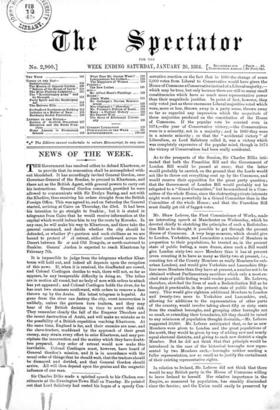Mr. Shaw Lefevre, the First Commissioner of Works, made an
interesting speech at Manchester on Wednesday, which he devoted chiefly to sketching the principles of such a Redistribu- tion Bill as he thought it possible to get through the present House of Commons. A very large measure, which should give to London, Yorkshire, and Lancashire a number of Members in proportion to their populations, he treated as, in the present state of public feeling, a mere dream, since such a Bill would give London sixty-two more Members than it has at present (even counting it to have as many as thirty-two at present, i.e., counting ten of the County Members as really Members for sub- urban London), and would give Yorkshire and Lancashire fifty- four more Members than they have at present, a number not to be obtained without Parliamentary sacrifices which only a most ex- cited state of public feeling would render possible. Mr. Lefevre, therefore, sketched the lines of such a Redistribution Bill as he thought it practicable, in the present state of public feeling, to carry. This would give eighteen additional Members to London and -twenty-two more to Yorkshire and Lancashire, and, allowing for additions to the representation of other parts of the country, would involve taking about fifty or sixty seats from the smallest boroughs, and grouping other boroughs not so small, or extending their boundaries, till they should be raised to any minimum of population thought desirable,—Mr. Lefevre suggested 20,000. Mr. Lefevre anticipated that, so far as new Members were given to London and the great populations of the north, they would be given by way of adding new and nearly equal electoral districts, and giving to each new district a single Member. But he did not think that that principle would be introduced in the case of the historical boroughs now repre- sented by two Members each,—boroughs neither needing a fuller representation, nor so small as to justify the curtailment of their existing representative rights.






































